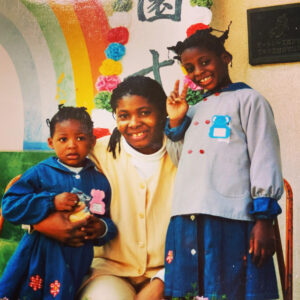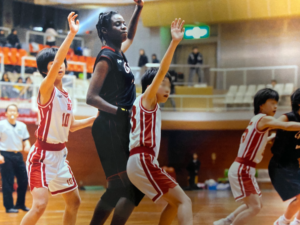Accept differences from others positively rather than feeling sorry.
Evelyn Mawuli is a central player on the Japan Women’s national basketball team who helped the team win the silver medal at the Tokyo Olympics. She is not just famous for her outstanding performance as a basketball player. Her bright personality with a great sense of humor have attracted attention across the country and today she is much sought after by the mass media. She is also an entrepreneur, who recently started benchers. But even Evelyn went through rough times, especially from her childhood to adolescence, because of her roots. How did she overcome her problems? How did she generate energy out of those experiences?

Respond with humor to heartless words
In the world of top athletes, it is your performance that matters, not where you come from. And nowadays, it’s nothing unusual to see athletes with foreign roots playing in various sports representing Japan. While it is not just about sports, national team members who carry the country on their shoulder are the center of attention.
And some of those players have experienced prejudice because they do not look like Japanese for example. Evelyn is one of them. She began to be conscious about the differences from the children around her when she started going to elementary school.
“Kids say whatever that comes to their mind without giving it much thought right? It hurt me when a friend of mine, I thought I was pretty close to until that time, said something mean about how I looked. Things like that used to put me down from time to time”, Everyn recalls.
“Why am I not like others?” Everyn asked her mother. And her mother responded “Do not feel sad about being different from others and embrace who you are”. At first, Evelyn didn’t understand what her mother was talking about. She was expecting her mother would say something more comforting.
“But after all, that teaching helped me through the hard times the most. My mother kept asking me, “Why do you want to be like other people? Do you want to lose your personality?”

Then, Everyn began to respond to cruel words with humor, rather than anger, to accept who she was. And she says that changed how people treated her.
“They realized I was an interesting kid, that was a big change. Of course, those kids didn’t have any right to say mean things to me, but they didn’t really have any bad intentions because they were just kids after all. They didn’t know how to deal with me, so they were saying those thoughtless things. It was not easy to forgive them, but things started getting better when I changed my attitude.”
Encounter with basketball
Shortly after that, around when she was in the 4th grade of elementary school, she joined a local basketball team.
At that time, she admired an NBA player, Dwayane Wade.
Not only he played excellently but also he had succeeded as a basketball player despite the fact he was raised in a poor environment in the hood. So, he was a perfect role model for Evelyn.
Evelyn saw herself in the player because occasionally she still felt frustration because of her roots, even though she had learnt how to deal with people around her better.
Her encounter with basketball enhanced her self-affirmation and rebellious spirit even further. Again, it was her attitude to convert differences from others into positive energy that helped her.
“I was tall, so I just had to wait for a pass under the hoop to score a point. And players of the opponent were complaining, “That is not fair, she is too tall.” But if I wasn’t using my height as a basketball player, they would have said I was being lazy. So, if I am getting complaints either way, why shouldn’t I take advantage of it?
To tell you the truth, I didn’t mind such noises, I actually enjoyed them.”
“I was tall, so I just had to wait for a pass under the hoop to score a point. And players of the opponent were complaining, “That is not fair, she is too tall.” But if I wasn’t using my height as a basketball player, they would have said I was being lazy. So, if I am getting complaints either way, why shouldn’t I take advantage of it?
To tell you the truth, I didn’t mind such noises, I actually enjoyed them.”

And she says it was “being seen by people” that helped her self-affirmation grow, more than her success in the sport. She drew attention precisely because she was different from others, and she began hearing other players saying they wanted to play with her. She says that increased her motivation even more.
On the other hand, her sister Stephanie who is also a professional basketball player like her sister says, she didn’t struggle with how people treated her as much as Evelyn. People around her already knew how to deal with her, thanks to Evelyn for setting a precedent. “I think I was protected by my sister”, Stephanie says later.
Success as an entrepreneur
In addition to her craze for basketball and aspiration to become a top athlete, she had another dream. She wanted to become a “company president”.
The main reason was financial difficulties she suffered. Her parents were both factory workers and they were not making good money. There were times she felt sorry for herself but she managed to convert such negative feelings into positive energy by envisioning herself “winning a ticket to the Olympics” and “becoming a successful business owner”.
She has now become a business owner who launched 2 businesses. She may not be totally satisfied yet, but she has realized both of her dreams, becoming an olympian and owning businesses of her own.
In 2020, she launched her first business. Immediately after that, she launched the second one. Now her main focus is on a service called “Quick Coach”, which serves as an interface to 1 min-video coaching by top athletes on a variety of sports. She launched the business during the stay-at-home period amid the Covid-19 pandemic. It should not be an easy task juggling the startups with her responsibilities as a professional basketball player.
“My motto is “Why not?” With that mindset, if there is anything I am interested in doing, I always give it a try. While the service is not making profits yet, the number of subscribers is definitely increasing.”
Through the business, she aims to provide a platform where children who engage in sports have access to coaching they need, and at the same time, athletes retiring from the forefront, not knowing what to do with their career lives next, can make use of their knowledge. It was her devotion to the sport as an athlete that allowed her to come up with the idea for the business.

“For example, knowledge about management, investment or programming can bring in profits or add value when accumulated with more experience. Even in the world of sports, there are many people who need knowledge accumulated by top athletes. So I am hoping to provide a platform where such knowledge can be fully made use of.”
Speak to people to derive energy
Some immigrant youths struggle learning Japanese or find it difficult to be positive about their future, because they did not come to Japan on their own will, unlike international students.
There are also cases where immigrant youths born in Japan keep living within a limited community of their own ethnicity.
It’s highly likely that such immigrant youths are not even aware of options other than what their parents or relatives do, or give up making choices of their own altogether due to their financial situations. Everyn was born in Japan and therefore learning the Japanese language was not an issue. But she also had mental distress over her roots and suffered from financial difficulties. When she was about to start her adolescence, she sometimes disobeyed her teachers and stopped going to school.
And yet, she managed to convert her predicament into positive energy without straying her path too much. When asked how she did, she answered,
“I think what helped me was speaking to adults around me without holding my feelings to myself, not knowing what to do with my situation. To my parents, teachers and neighbors. I would ask for their help, or tell them what I wanted to do, while feeling embarrassed for doing that. ”
Without doubt her immigrant background played a big role in her success. She has the explosive strength of today, precisely because she experienced negative emotions such as sadness and anger.
“I went through a lot of hardships and agony as a child, and in that sense I have experienced things not many other people experience. I think I am not afraid of trying many things because I feel comfortable to set goals and strive to achieve the goals, thanks to those experiences.”
Self-development is the key for career formation
And her message to children with foreign roots about choosing a job is also unique.
“I was poor myself, so I don’t want to sugarcoat the reality, you do need to earn money. When choosing a job, maybe you can start looking from what you are better at than your Japanese friends, like your mother language for example, in addition to searching from what you like. I think it is important to differentiate yourself from Japanese people first and make that your selling point.”
Accept differences from others positively rather than feeling sorry. Evelyn has taken in the words of her mother in her attitudes toward work also. If you can appreciate and improve your uniqueness, rather than finding comfort in being like others, such uniqueness can be a great strength in career formation.
“I think it is natural you want to belong somewhere. But first you need to accept yourself as who you are, in order to be kind and relate to others. You may not see yourself attractive yet, but we all have attractiveness. Please discover yourself and find your own attractiveness. It should not be difficult for you to find many role models now that we are in the era of smartphones. That someone can be far out of reach for you now, but I think what’s more important is for you to try to come close to that person.
Evelyn still has a long way to go to achieve all of her goals. Now she wants to be someone who passes on what she has experienced through basketball and her businesses to the world. There will be a number of children who look up to her as a role model who keeps pursuing her dreams.
Interviewing and writing: Hiroshi Yoshida
★★★ Please take a look of Evelyn Mawuli’s interview video ★★★

